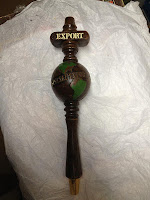Tap Handle #235: Heileman (Pabst) - Special Export Globe
This is not a very fancy tap handle, but I have a soft spot for Special Export...I have several of their lighted bar signs because they are usually nautical or world-traveling themed. The words "Special Export" on the globe could use a little touch up, and it's showing some wear, but it's a classic. It's an old wooden tap from the 70s or early 80s.
Johann Gottlieb Heileman was born in the German state of Wurttemberg in 1824. In 1852 he left for America and soon settled among many other German immigrants in Milwaukee, where he helped to found a bakery. Five years later he moved to the western Wisconsin city of La Crosse; his first job there was at a small brewery recently started by fellow German immigrant Johann Gund. Gund entered into an agreement with Heileman to build the new City Brewery. The partnership between Gund and Heileman lasted for 14 years until 1872, when Gund sold his interest to Heileman. The sudden death of Heileman in 1878 saw his widow Johanna keep the brewery open, becoming the first female CEO of an American brewing company. She continued her involvement in the business until 1911.
In 1902 Heileman replaced their flagship brand, Golden Leaf, with Old Style Lager. During Prohibition, Heileman reduced its staff and produced non-alcoholic “near beer” and sold malt. After Prohibition ended in 1934, when the Heileman's brewery workforce asked for an extra strong brew to be made for the annual company picnic, the brewmaster concocted a new recipe, and Heileman's Special Export was born. Demand for Heileman brands became greater than capacity and they grew rapidly. By 1967 Heileman was able to purchase Wiedemann. The acquisitions continued with Blatz, Carling, Rainier, and Lone Star. In the 1980s, they briefly occupied third place behind Anheuser-Busch and Miller Brewing. But it all came crashing down when Alan Bond, who had recently taken over Australian brewers Swan, Castlemaine and Tooheys, persuaded Heileman shareholders to accept a leveraged buyout, financed with junk bonds. Costs were trimmed, but instead of spurring growth and profit, the result was that sales declined and the company began to lose money.
In 1990, Bond was forced to resign from his own holding company and served four years in prison for financial fraud. With the value of its growing debt exceeding its assets, Heileman declared bankruptcy in 1991. In 1993 the court allowed Heileman’s creditors to sell the company for $390 million to a Texas investment partnership that specialized in turning around troubled firms, but the new owners had no experience in brewing. They turned to Joe Martino, who had went from sales and marketing jobs for Anheuser-Busch and Miller, to federal prison for conspiracy and filing a false tax return. Despite his prison sentence, Martino was well-respected among wholesalers and industry executives, and was named the new marketing and sales chief of Heileman. In an effort to generate more revenue, Heileman had been heavily discounting its beers, which instead drove their profit margins down. Seeing the need to market higher-price extensions of its popular-price and premium-price brands, Martino helped launch Old Style Grenadier in the Midwest, Rainier Yakima in the Northwest and Lone Star Sabinas in Texas, as well as Henry Weinhard Boar's Head Red.
The premium brands did not generate enough income to rescue the company as planned. In early 1996, faced with the inability to make required interest payments and meet its payroll, Heileman declared bankruptcy a second time and was acquired by Stroh, which was fighting for its own survival. Stroh used the Heileman facility in La Crosse to brew a variety of brands, but beer sales flattened, and Stroh announced in 1999 that it would cease brewing and sell its brands, including Heileman’s, to Miller and Pabst.
The La Crosse brewery, home to Heileman operations for 138 years, closed in 1999. A group of former Heileman managers and local business leaders sought to find a way to reopen the plant. There were several false starts, but by early 2001 the newly resurrected City Brewery was again brewing beer. They secured contracts from other brewing firms such as Pabst. City Brewery does not own any of the former Heileman brands, which belong to Miller and Pabst, although ironically one of the beers they brew under contract to Pabst is Special Export.
Special Export is a pale lager brewed to be crisp and smooth with a true European taste profile. Recommended food pairings include bratwurst and picnic food. Weighted average on ratebeer.com is 1.82 out of 5.


Comments
Post a Comment